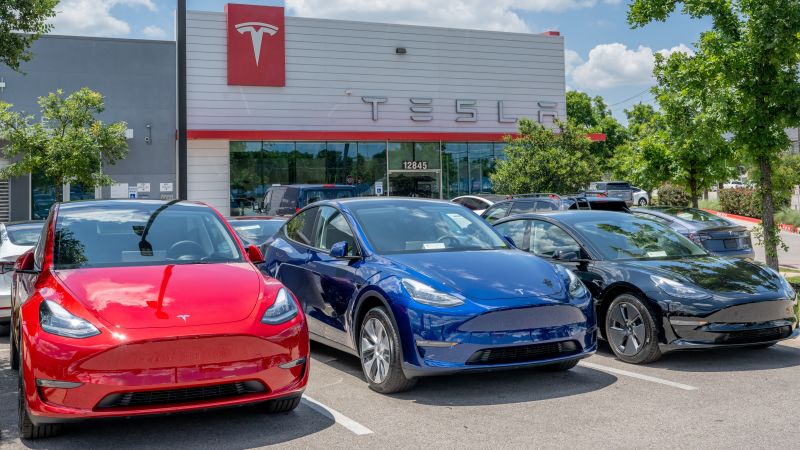Last quarter, Tesla posted its first annual sales decline since the pandemic — a drop that was significantly worse than expected. The company blamed a weak Chinese economy, arson at its German factory and supply constraints because of escalating conflict in the Middle East.
Those factors certainly aren’t helping. But Tesla’s problems can’t all be blamed on outside factors. Some of it is inevitable. New competitors have entered the market and, at some point, they had to start taking sales away from Tesla.
And now they are.
Tesla made itself an easy target by failing to introduce new products fast enough to maintain customer interest. Also, its chief executive, Elon Musk, has become someone many people don’t want to associate themselves with, even for a good car.
Meanwhile, overall electric vehicle sales in the United States have flattened out in recent months. EV sales growth has been slowing for a while but in the last two quarters, EV sales didn’t increase much at all, according to estimates from Cox Automotive.
But, upon closer inspection, what seems like widespread disinterest in electric vehicles may reflect, largely, less interest in Tesla.
Some automakers, including Audi, BMW, Mercedes and Rivian, are reporting EV sales growth of more than 50% over the past year, noted Stephanie Valdez Streaty, an analyst with Cox Automotive, in a presentation summarizing industry trends in the new year. Ford later said its EV sales were up 86%.
“Looking at the data, the big [EV] slowdown is shaping up to be a Tesla slowdown,” said Valdez Streaty.
Tesla’s stock price has dropped by nearly a third in 2024 as the company’s sales numbers and profits have disappointed. It’s been one of the worst performers in the S&P 500 so far this year.
Last year, Tesla sales were up 38% compared to 2022, but investors had expected more. Tesla warned in January that sales growth this year would be even slower.
As it turned out, sales haven’t grown at all in 2024. Instead, Tesla’s global first-quarter sales plunged more than 20% from the same time last year, marking the first time since the covid pandemic that sales have gone down over a year.
Tesla wasn’t just a victim of a general slow-down in EV interest, though. In the United States, Teslas still made up about 56% of all electric vehicles sold in 2023. While that’s much less than the roughly 80% of EV sales Tesla accounted for in 2019, according to Edmunds.com, it’s still a majority. When Americans lose interest in Teslas, it can look like an overall lack of interest in electric vehicles.
Between the first quarter of 2023 and the first quarter of 2024, US electric vehicle sales grew an estimated 15%, according to a recent report by Cox Automotive. But, if you leave out Tesla, sales of other electric vehicles, as a group, were up 33%.
The Tesla Model 3 and Model Y, its most popular models by far, are seven and five years old, respectively. Other automakers, like Ford, Audi, and Hyundai, offer competitive EV models that are much newer to the market.
“The two core Tesla products are excellent vehicles, but the auto industry revolves around ‘new’ models and fresher alternatives from competitors are likely slowing Tesla demand,” Valdez Streaty said in an email to CNN.
Tesla did not respond to a request for comment on the age of the company’s vehicle line-up.
The Tesla Cybertruck is new and garnering a lot of attention but it’s only just come out and, so far, is produced and sold in low numbers. Tesla is also rolling out an updated version of the Model 3 — although it remains, fundamentally, the same car.
Chinese automakers like BYD are also a major threat globally but they’re not even competing in the US market yet. Musk himself has called them “the most competitive car companies in the world.”
Musk’s brand
Tesla’s chief executive, Elon Musk, could also be causing problems for the brand with his increasingly controversial public pronouncements.
Musk has, in recent years, defended racist tirades and agreed with antisemitic statements. Also, Tesla removed support for diversity and inclusion from its financial reports while X, as Musk renamed Twitter after buying it, re-instated the accounts of avowed racists.
Survey data from Caliber, a Denmark reputation management firm, indicates that Tesla’s reputation and customer purchase consideration for its vehicles fell sharply starting around the beginning 2022 — the year Musk took over the social media platform originally called Twitter — and have continued to decline since then. The data was first reported by Reuters.
While Caliber’s data doesn’t make firm connections to specific causes, the company’s reseach also uncovered low opinions of Musk, himself. Musk and Tesla are, by far, much more closely connected in public perception than most CEOs and the companies they run, said Søren Holm, head of client services for Caliber.
“He could, perhaps, not be more of a bright star at the top of Tesla than then he is. He’s a man of the year, he’s the richest person alive. Just heralded everywhere,” he said in an interview with CNN. “And then he’s using all of this otherwise positive attention to create some negative attention around himself.”
Tesla did not respond to a request for comment on the impact of Musk’s statements.
Both Musk and Tesla have low “trust and like” scores in Caliber’s analyses. Recent declines in “trust and like” scores for X, the social media platform formerly known as Twitter before Musk bought it in 2022, suggests that the man in charge of both companies could have something do with their declining public regard.
Opinions of Tesla dropped sharply starting in 2022 as Musk had openly railed against Covid-19 restrictions, but the decline has continued since then as Musk has made or supported public statements that were racist, anti-semitic or
“He’s beginning to get this reputation of being a very kind of loose gun,” Holm said.
As competing models hit the market that are similar in price, quality and performance to those Tesla offers, the public image baggage Musk adds to the brand could dissuade shoppers, Holm said.
“That’s something where the reputation a CEO imprints on a company’s brand and expression is carrying a lot of weight,” he said.
– CNN’s Chris Isidore contributed to this report.
Read the full article here




